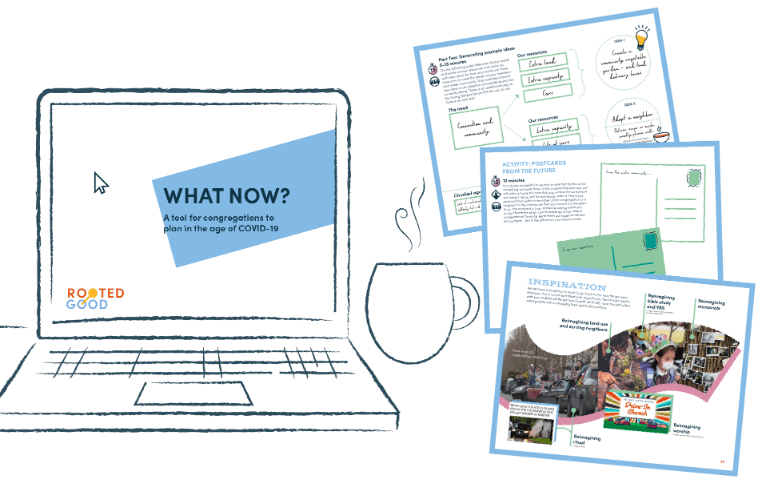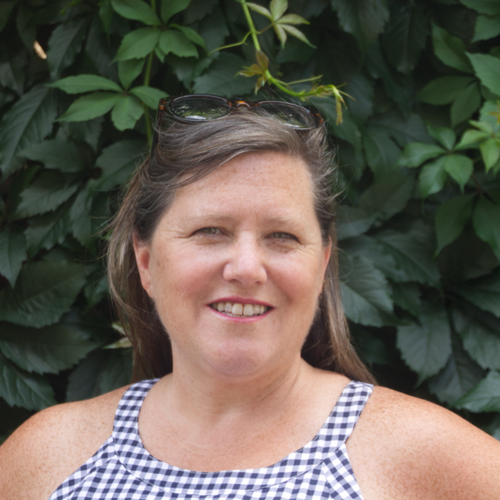I have spent my entire ministry believing that disruption can be a good thing. Maybe that’s hard to accept in the midst of a pandemic. But when things are disrupted, something new can break in.
My ministry was born out of a frustration that too often we perpetuate models that no longer apply to the world in which we live, excluding and leaving people behind. To me, that is the antithesis of the hope of the gospel.
I have spent over 20 years pursuing alternatives, the last 15 alongside entrepreneurs faced with intractable challenges and systems that just aren’t working. I founded Matryoshka Haus, a nonprofit that was part incubator, part community, part training organization.
Yet after training entrepreneurs to tackle wicked problems and think in new ways, Matryoshka Haus found itself in a place where its model was no longer working. We had to do what we have advised others to do: we had to pivot.
Our organization has become three different nonprofits, including RootedGood, which empowers institutions, social enterprises and entrepreneurs to make good in the world. You’ll hear more about why we did this below.
From this experience, we have identified five distinct phases of a pivot -- five stages you need to move through when the structures you’ve built no longer work.
In addition, RootedGood just released a tool called “What Now?” -- a decision-making tool that helps leaders understand and map their changing needs and constraints, consider their resources and design new ways to respond to the challenges and opportunities they face.
I am sharing both our experience with the five stages and the free online tool because I believe they are relevant to all of us today.

The five stages of a pivot
1. Recognition
Recognition is often the hardest stage in the process. You have to see that something isn’t working.
Cognitive bias predisposes us to retell a narrative suggesting that something is working or that the outcome makes it all worth it.
To recognize that something isn’t working does not mean that nothing good has come of it -- rather, that the good does not fully reflect the intended impact.
At Matryoshka Haus, by some metrics we entered our pivot year more successful than ever. We were winning awards and getting the work we wanted with the people we wanted to work with.
At the same time, the wheels were coming off internally. We were burning through volunteers, our team was overfunctioning, and our reserves were tapped out. We were working harder and harder but not able to come up for air.
We hired a managing partner, and when he held the mirror up to us, we had a come-to-Jesus moment. Something had to change.
We can extend this to the COVID-19 world around us as well. Can’t we recognize that there is something broken in our ecclesiology and in our economics when the gap between rich and poor is getting bigger? Can’t we see that our churches’ economic models are failing when the church looks as busy and stressed out as the business world?
It is time to recognize that we’ve been totally out of control and the way we’ve been living hasn’t been good for people or the planet.
2. Grief
Once you recognize that things have to change, you feel loss -- and with it, a deep fear because of the uncertainty of what will replace it.
Christians are a people that believe in a gospel of death and resurrection. But too often, we rush from death to resurrection and don’t acknowledge the pain and the loss. The challenge here is not to rush or move on too quickly. We need to acknowledge the loss and make space for our feelings.
For me, the grief about Matryoshka Haus was as much about the lost ideal as anything else. For so long, I believed that if we just worked harder it would all be OK. I believed that we really could overcome any obstacle. We were smart, creative and tenacious, and we were in it together. One of the hardest things was acknowledging that we, as a team, couldn’t move into the future together, and that whatever came next would be different.
With the current pandemic crisis, we’ve lost some of our sense of security. We are separated from others. Our economy is crumbling around us. And one of the hardest things is that we aren’t comfortable with grief. If we cannot acknowledge what is being lost, it is impossible to move forward in a healthy way.
Grief needs a way to commemorate and memorialize. At Matryoshka Haus, we created a ritual to allow ourselves, our community and other stakeholders the space to mourn and celebrate. We held a service that allowed other people to mark the changes with us, celebrate the past and pray for the future.
3. Learning
You don’t want to sit in grief forever. In this step, we start to see the things we want to take with us and the things we need to leave behind. We need to find a way to sift through the rubble and pull out the essential and meaningful parts from the past, but we also need to identify the assumptions that were problematic.
At Matryoshka Haus, we had several faulty assumptions. Things that worked for us when we were young and small became part of our Achilles’ heel as we grew.
For instance, we believed that our complexity was a gift, being part incubator, part community, part training organization. And the truth is that when we were young and new and small, it was an asset. But as we grew, that asset became a liability; everything became messier and more entangled.
However, we still had a lot going on that was good and worth celebrating. One of the most beautiful and powerful things that happened at our commemorative service was hearing people who had worked with us in different seasons talk about how they had been affected.
Our work was having a lasting impact, and in more powerful ways than we knew. There was gold in that, and whatever we do next, we want to create more ripple effects!
In our new COVID-19 world, we are still learning, but some lessons are becoming clear: how fragile our economic and civil systems are, as well as our models of church.
If we really have the courage to be honest, people on the margins have been telling us this all along. The church has been measuring success by the number of people in the pews and the amount of money in the offering plate -- as if that reflected authentic discipleship or the existence of beloved community.
Surely, we are realizing that individualism only gets us so far. We are interconnected. The opportunity here is to ask, What, then, is our path toward mutuality and interdependence, toward mercy and justice?
4. Renewed vision
There has been a lot of talk in recent years about “knowing your why.” Your why is what helps you get back in the ring. When you truly grab hold of your why again, then the how you do your work and the what you do doesn’t matter.
What matters is the telos. To what end are you working? What is your desired impact? What transformation will you see in people, places, policies or systems? When you think through the lens of impact and purpose -- the why -- then you can more easily redesign the how and the what.
This is the step where hope can break back in. It’s where we can be more aware of both the opportunities and the challenges. We understand the reason we exist, and we can acknowledge our false assumptions.
At Matryoshka Haus, I had to go back to what got me into this work to begin with. Acts 17:6, which talks about “the ones that have turned the world upside down” with the gospel, has been a driving force for me.
It is the impulse of Christian innovation to demonstrate that another world is possible. So when Matryoshka Haus decided to restructure, we did it with our core intent in mind: whatever we did, we wanted it to be doing transformative work at a systems level.
In our infancy, we did that by incubating our own projects. In the next season, we will do that in partnerships.
I don’t know the why for America or the world in this time of crisis. But for Christians, surely our why takes us back to the fact that we are not meant to serve ourselves but the Lord. We are called to love God and love our neighbor as we love ourselves. Maybe that seems simplistic. But it is the answer Jesus gave when asked what is the heart of the gospel.
5. Re-imagined practice
Once you get clearer on your why and the impact you want to have, then you can re-imagine the how. This is where new practice can be developed.
In stage five, we hit the place where it is time to be brave again. But as we start again, we do it with our eyes wide open. Knowing more than we knew before, we get back in the ring.
Kenda Creasy Dean teaches practical theology and social innovation at Princeton Theological Seminary. She says that 90% of first-time entrepreneurial ventures fail but 80% of second-time ventures succeed -- yet 90% of first-time entrepreneurs don’t try again.
Our pivot ended with a birth of new things. We decided to restructure all of our work into three new organizations, two in the U.K. and one in the U.S. In my new role, I am a co-founder and the lead cultivator of the U.S.-based RootedGood. The other spinoffs are Goodmakers Society and the Ti Group.
Rather than holding on to the complexity we once cherished, this restructuring allows each organization to focus on its mission and landscape and live out its prophetic imagination.
I have shared this five-stage process because I believe that the current disruption of a global pandemic is a moment in time where we, as Christian leaders and the church writ large, are being invited to pivot.
The world needs us to show up as a hopeful people and to be good news people. And this current crisis gives us the perfect opportunity to turn the world upside down with the gospel.













